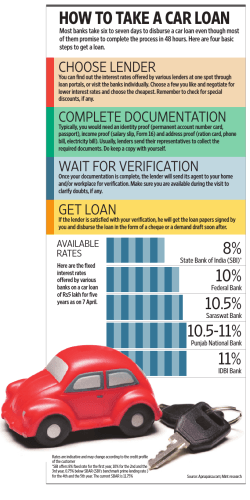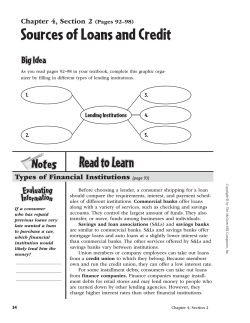
Document 177510
Ed Zoller’s Inside Secrets Of How To Get A “Yes” When You Borrow Here’s What It Helps To Know About Interest Rates, Points, And The . “Mysterious” APR When you get a mortgage, there are three important terms for you to remember. • Interest Rates • Points • APR I’ve combined these three terms here because they’re related, and you’ll understand them better if I explain them together. Interest Rate: “Interest Rates” are the price that Lenders charge for the use of their money. So, when interest rates are high, it’s because Lenders are charging you more to use their money right now. Again, it’s a trade-off between now and later. Lenders are only going to give you so much money to use over the next 15 to 30 years (the life of your mortgage). They work backwards from that figure using interest rates. Lenders approve loans based on their impression of your ability and INTENT to pay it back. To figure this out, they look at five things: creditworthiness, income, job longevity, job stability, and future income prospects. We’ll tell you how to make sure you look good in each of these things, so that you’ll get a “YES” when you want to borrow money for your new home. This is to make sure that there are no errors or surprises that you’ll have to explain to the Lender. If there are mistakes, it can take a few months to resolve, so it’s good to have a compelling explanation ready when the Lender sees it! The best way to demonstrate that you are “creditworthy” is to pay your bills in full and on time, particularly for the year or two before you want to get a loan. 1. Creditworthiness 2. Income Creditworthiness is your history of borrowing and repaying against things like loans, credit cards, rent, and whether you’ve ever filed for bankruptcy. Find out what credit bureau the Lender uses, then call or visit that same bureau for a copy of your credit report. Some are even available online. Lenders want to know that you have a history of sufficient and consistent income – so that you’ll be able to repay the loan. So, when you submit your paperwork to a Lender, make sure to take a letter verifying your employment (how long and what your salary is), your last couple of paychecks, and your last couple of W-2 forms. If you have a higher interest rate, you have less money to spend now. If you have a lower interest rate, you have more money to spend now. Points: I want to tell you about a funny word – it’s one of those words that doesn’t mean what you might think it means when you hear it. (Like when the waiter at the restaurant asks you if you would like your “check,” and somehow you know that what they really mean is your bill, but you say, “Oh yes, thank you.”) When you hear the word “points,” what do you think of? Maybe points in a football game? Maybe a test score? Well, some smart person in the mortgage industry started using the word “points” to mean 1% of your entire loan amount, that you get to pay up front, as a fee for certain things. 3. Job Longevity Lenders are looking for borrowers who have a stable source of income. If you can show that you’ve been employed at least a year in the same company, you should be fine. 4. Job Stability Again, lenders like stability – they tend to think that your loan payment behavior will reflect your employment behavior. So, don’t make lateral moves between companies just for the sake of change. If you make moves, do it for promotion, or to earn more money. 5. Future Income Prospects Because most loans are paid back in 15 to 30 years, Lenders are interested in people who will have income for that amount of time. Young professionals, or those with high-demand skills, are the most appealing to Lenders because their income will only increase over time. If you can demonstrate that you have a career plan that only gets better over time, you’ll be in a strong position to borrow. So essentially, pay your bills on time, stay with an employer, have a career path that shows potential, and you’ll be sure to get a “YES” when you borrow. Lenders are required to tell you what the APR is on any loan that they’re offering to you so you’ll know what the real interest rate is, including all of the additional costs. So, when you’re calling around looking for the best rates, make sure and ask what the APR is on each loan you’re being told about! So let’s say your mortgage is for $200,000. One “point” would mean $2,000. Now I’ll tell you about the third term and how it relates to the first two. APR: “APR” stands for “Annual Percentage Rate.” That sounds friendly, too, doesn’t it? The APR is what you get when you add the interest rate, the points, and all of the other fees together and then calculate what the loan will cost you each year, based on all of the fees added together. Ed Zoller Villa Realty Group, inc Cape Coral, FL, 33904 www.capecoralforsale.net [email protected]
© Copyright 2026











